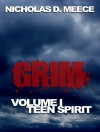The Complete Novels of Bram Stoker presents an extensive collection of the author’s gothic and supernatural fiction, showcasing his unique ability to weave intricate narratives that explore themes of fear, desire, and the mysterious. Stoker’s literary style is characterized by atmospheric prose and a meticulous attention to detail, immersing readers in the eerie worlds he creates. This comprehensive anthology includes his most renowned work, ‘Dracula, ‘ alongside lesser-known novels like ‘The Jewel of Seven Stars’ and ‘The Lady of the Shroud, ‘ offering a spectrum of Victorian anxieties regarding sexuality and colonialism, intertwined with elements of horror and the uncanny. Bram Stoker (1847-1912) was an Irish author whose fascination with folklore and the macabre played a significant role in shaping his literary voice. His background in theater as a business manager for the famed actor Henry Irving allowed him to hone his storytelling techniques and focus on suspenseful visuals. Stoker’s experiences with Victorian society’s obsessions and fears undoubtedly informed his explorations of the dark side of human nature and the supernatural in his novels. For readers interested in classic literature that delves into the darkest corners of the human psyche, The Complete Novels of Bram Stoker is an essential addition to any bookshelf. This anthology not only reveals the origins of modern horror but also offers a profound commentary on the social issues of its time. Stoker’s vivid storytelling continues to resonate, making this collection a must-read for both horror aficionados and literary scholars alike.
A propos de l’auteur
Bram Stoker, born Abraham Stoker on November 8, 1847, in Clontarf, Dublin, Ireland, is an author whose name has become synonymous with the Gothic horror genre, primarily because of his seminal work, ‘Dracula’ (1897). Before penning the novel that would crown him as a literary icon, Stoker graduated from Trinity College with a degree in mathematics and pursued a career in civil service. Simultaneously, he nurtured his interest in the arts, becoming the theatre critic for the Dublin Evening Mail and later managing the Lyceum Theatre in London. Stoker’s literary pursuits were diverse, as evidenced by his various writings that include horror, romance, and adventure, compiled impressively in ‘The Complete Novels of Bram Stoker.’ His narratives often delve into themes of the supernatural intertwined with Victorian sensibilities, serving as a reflection of the anxieties and fascinations of his era. Stoker’s work has seen extensive scholarly analysis, with ‘Dracula’ inspiring a multitude of adaptations across various media. His style, which often incorporated epistolary techniques, was innovative for its time and remains influential. Stoker passed away on April 20, 1912, but left an indelible mark on the world of literature with his chilling prose and hauntingly memorable characters. His contributions have solidified his status as a towering figure in the canon of horror writers.












